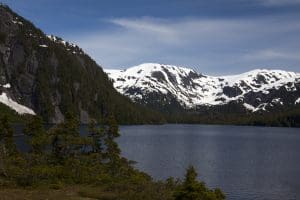Federal agencies protect more than 9.5 million acres of U.S. land
Donald Trump’s administration had tried to open old-growth forests in Alaska and Minnesota to logging and mining.

Two federal agencies last week announced actions that will protect more than 9.5 million acres of land from development and natural resource extraction.
The U.S. Department of Agriculture on Wednesday said it had repealed a rule implemented in 2020 that would have allowed new roads and logging in the Tongass National Forest in Alaska. The decision restores previously existing protections to 9.37 million acres of the 16.7-million-acre park, which the Forest Service says is the largest intact temperate rainforest in the world.
The department said in a statement, “This action is among a series of steps the Biden-Harris Administration has taken to conserve and restore some of America’s most cherished lands and waters, many of which are sacred to Tribal Nations.”
“Restoring roadless protections listens to the voices of Tribal Nations and the people of Southeast Alaska while recognizing the importance of fishing and tourism to the region’s economy,” Agriculture Secretary Tom Vilsack said.
The decision restores the 2001 Roadless Area Conservation Rule issued under former President Bill Clinton, which prohibited road construction and reconstruction in most areas designated as roadless. The rule also limits the harvest of timber in those same areas.
Former President Donald Trump’s administration made a new rule that stripped the protections put in place for roadless areas in the Tongass National Forest in 2020. Under Trump’s policies, logging companies would have been free to harvest timber in the region, including from old-growth stands of cedar, hemlock, and spruce trees. Timber sales in the region that were advanced during the Trump administration were frozen by the Department of Agriculture in 2021 under President Joe Biden, and a coalition of environmental and tribal groups sued in federal court to prevent implementation of the Trump rule.
The Biden administration said restoration of the 2001 rule would help protect the watershed, the climate, and areas of concern to Native American tribes.
“The Tongass Roadless Rule is important to everyone. The old-growth timber is a carbon sink, one of the best in the world. It’s important to our way of life,” Joel Jackson, president of the Organized Village of Kake, Alaska, said in a statement published on the website of the nonprofit environmental law organization Earthjustice.
Gloria Burns, vice president of the Ketchikan Indian Community Tribal Council, said: “The Tongass National forest has provided for the people of this land since time immemorial and in many ways, the forest is the lungs of the world. The reinstatement of the Roadless Rule is an important step.”
Environmental groups also expressed their support. Patrick Lavin of Defenders of Wildlife said, “Today’s action helps restore responsible stewardship in the Tongass, as demanded by an overwhelming majority of people during the public process.” Kate Glover of Earthjustice said, “This is great news for the forest, the salmon, the wildlife, and the people who depend on intact ecosystems to support their ways of life and livelihoods.”
On Thursday, the Interior Department said that a 20-year ban on mining would be put in place for 225,504 acres in Superior National Forest in the Boundary Waters watershed region in Minnesota.
The order prohibits the region from being used for copper, nickel and other forms of mining after a determination that toxic leaching could contaminate water that is vital to the ecosystem in Boundary Waters. The Trump administration had attempted to allow mining in the area despite environmental concerns by cutting short an environmental review and issuing mining leases. Those leases were canceled by the Biden administration in January 2022.
“Protecting a place like Boundary Waters is key to supporting the health of the watershed and its surrounding wildlife, upholding our Tribal trust and treaty responsibilities, and boosting the local recreation economy,” Interior Secretary Deb Haaland said in a statement.
Friends of the Boundary Waters Wilderness, a nonprofit group that advocates for protecting the region, released a message thanking Haaland “for working hard to protect the Boundary Waters and clean water for the American people.”
“Today’s science-based decision is a massive win for Boundary Waters protection,” Becky Rom, chair of the group Campaign to Save the Boundary Waters, said in a press release.
Blaine Miller-McFeeley, senior legislative representative for Earthjustice, said the mining ban was “a big victory for people and for climate.”
Published with permission of The American Independent Foundation.
Recommended

President Biden visits Prince William park to talk solar, youth involvement on Earth Day
Virginia set to receive $156 million from U.S. Environmental Protection Agency program
By Charlie Paullin, Virginia Mercury - April 23, 2024
Texas governor and attorney general do little to curb state’s chemical plant crisis
Republicans Greg Abbott and Ken Paxton have taken thousands of dollars in donations from chemical companies and their affiliated PACs.
By Jesse Valentine - December 08, 2023
‘We’ve been waiting for this’: Union workers cheer Biden’s hydrogen hub plan
Federal funding for the hub is estimated to bring over 20,000 jobs to the Pennsylvania-New Jersey-Delaware area.
By Anna Gustafson - October 17, 2023









































































